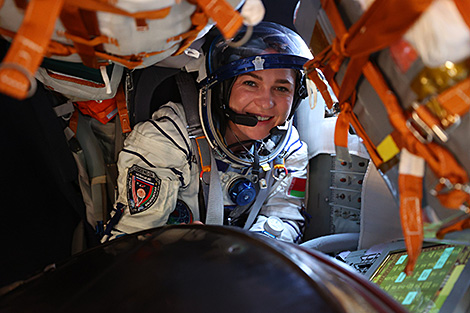Press releases
Belarusian cosmonaut to bring microbe samples from ISS to study on Earth

MINSK, 10 April (BelTA) – The Belarusian cosmonaut Marina Vasilevskaya collected samples of microorganisms while at the International Space Station (ISS) for the sake of having them examined by Belarusian scientists, BelTA learned from Tatiana Semashko, Deputy Director for Science and Innovations of the Microbiology Institute of the National Academy of Sciences of Belarus, during a press conference timed to World Aviation and Cosmonautics Day.
Tatiana Semashko said: “Monitoring the environment, in particular, the inside surfaces of the Russian segment of the International Space Station, is of great significance for preserving the health of the cosmonauts. This is why samples were collected. Personnel of the Institute of Biomedical Problems helped us decide where the samples should be collected. Microorganisms grow everywhere. Opportunistic pathogens can cause an illness in humans. And people at the ISS stay in an enclosed space. They experience lack of proper sleep and exposure to radiation. In other words, they are in stress conditions.”
The representative of the National Academy of Sciences noted that the Belarusian cosmonaut Marina Vasilevskaya had collected samples of microorganisms, which will be examined on the ground. “We will look at virulence factors. In other words, at how these microorganisms can affect humans and what happens to them in outer space,” she stressed.
Tatiana Semashko pointed out that microorganisms can also grow on equipment, for instance, filamentous fungi can do it.
She added that these samples will be studied later on in order to research their cultivatable forms and uncultivatable forms as well as examine their biological qualities and their mechanism of adaptation to extreme conditions. “For instance, we can determine the biotechnological potential of these strains. There may be strains that can affect plastic degradation. There can be many various applications,” Tatiana Semashko concluded.







 print version
print version make home page
make home page add to bookmarks
add to bookmarks

